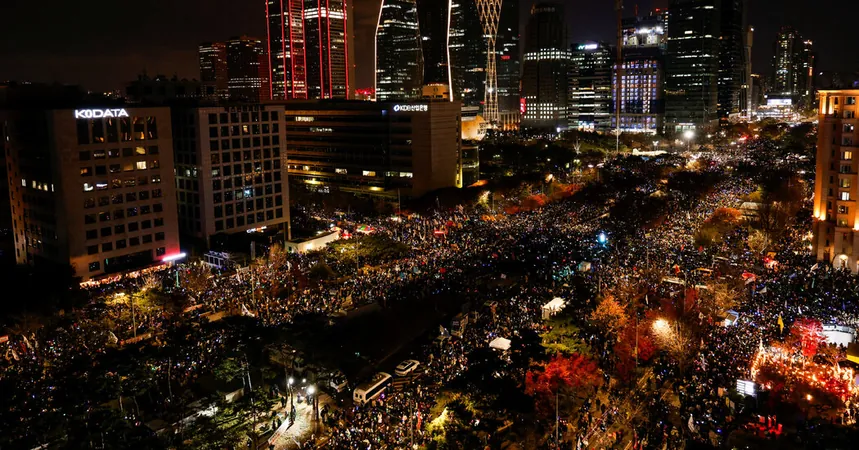
Massive Protests Erupt in South Korea, Demanding Impeachment of President Yoon Suk Yeol
2024-12-07
Author: Ming
In a dramatic showdown of political fury, tens of thousands of South Koreans rallied around the National Assembly in Seoul on Saturday, demanding the impeachment of President Yoon Suk Yeol. The fervent protests were in response to Yoon's controversial and fleeting declaration of martial law earlier in the week, which triggered a political crisis in the nation.
As lawmakers debated inside the assembly on whether to impeach Yoon, the atmosphere outside was electric. Protesters, spanning diverse demographics from families to students, chanted for hours, emphasizing their message: Yoon must go. This rally marked the apex of a week filled with escalating demonstrations across the country, showcasing the citizens' frustration with the current administration.
Prior to the vote, all but one member of Yoon’s party exited the chamber, showcasing a significant divide within the political class. Opposition leaders took this moment to try and rally support but faced obstacles as voting continued to stretch on. In an effort to exert pressure on the lawmakers, protest organizers, notably from one of South Korea’s largest labor unions, sought to surround the National Assembly premises, impeding any lawmakers attempting to leave.
Among the protesters was 35-year-old Lee Soo-jin, who expressed her determination by stating, “I will protest until Mr. Yoon is impeached,” highlighting the deep convictions held by many attending the rally. Her sentiments were echoed by others, including a mother, Lee Soo-young, who voiced concern for her child’s future, stating, “I don’t want him to live in a country that could be under martial law again.”
As darkness settled, the crowd only grew larger despite the plummeting temperatures, showing the sustained commitment of those opposing Yoon’s leadership. The Seoul subway even temporarily closed three nearby stations to manage the influx of protesters, yet supporters continued to find their way to the gathering with candles, colorful glow sticks, and blankets to keep warm. This vibrant atmosphere fostered camaraderie among participants as music and chants resonated throughout the area.
Social media played a crucial role in mobilizing protesters, with many using platforms like Facebook and X to coordinate transport solutions, including shuttle buses and flights from distant cities like Jeju Island. Additionally, creative strategies emerged, such as shared codes in local cafes to provide free drinks for demonstrators.
Meanwhile, away from the overwhelming numbers of dissenters outside the National Assembly, a smaller faction of Yoon’s supporters convened in another part of the city, showcasing a contrasting narrative. These supporters, despite Yoon's diminishing approval ratings, passionately waved the South Korean and U.S. flags while singing songs in his defense. They largely ignored recent controversies and instead focused their ire on the opposition party leader, labeling him as a Communist.
As South Korea stands at a political crossroads, the conflict between the supporters and detractors of Yoon Suk Yeol mirrors the broader societal rift, raising critical questions about the future of governance and democracy in one of Asia's most vibrant democracies. The nation watches closely, as the outcome of these protests will likely have long-lasting implications for Korea’s political landscape.



 Brasil (PT)
Brasil (PT)
 Canada (EN)
Canada (EN)
 Chile (ES)
Chile (ES)
 España (ES)
España (ES)
 France (FR)
France (FR)
 Hong Kong (EN)
Hong Kong (EN)
 Italia (IT)
Italia (IT)
 日本 (JA)
日本 (JA)
 Magyarország (HU)
Magyarország (HU)
 Norge (NO)
Norge (NO)
 Polska (PL)
Polska (PL)
 Schweiz (DE)
Schweiz (DE)
 Singapore (EN)
Singapore (EN)
 Sverige (SV)
Sverige (SV)
 Suomi (FI)
Suomi (FI)
 Türkiye (TR)
Türkiye (TR)